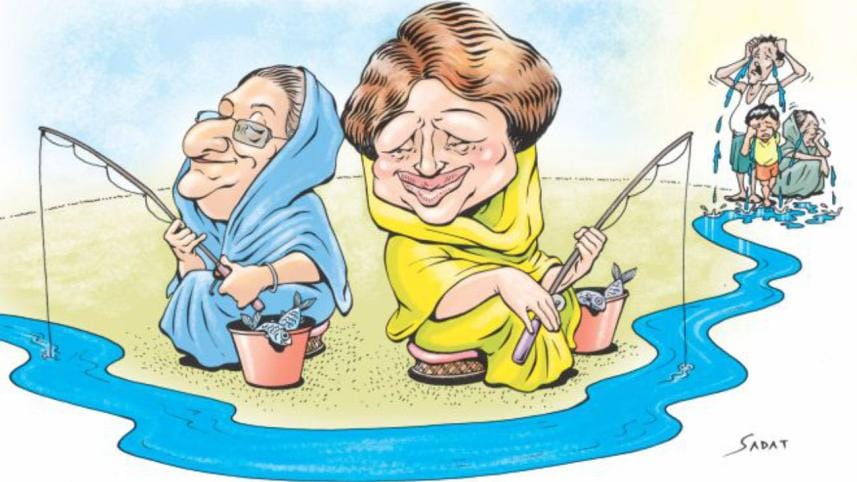Bangladesh's Intractable Political Woes

IN his book The Art of Positive Leadership: Becoming a Person Worth Following, leadership expert Retired Air Force General John E. Michel states that Caesar was able to triumph over Pompey with his "sustained commitment, decisiveness, courage to act, strong sense of fairness and discipline, trust and organisational strength through promotion of leadership by merit." These are the leadership qualities that helped Caesar triumph over a more cunning and militarily stronger Pompey especially at a time when his own soldiers were deserting him.
Bangladesh's two dominant leaders – Sheikh Hasina and Khaleda Zia – do reveal some but not all of the qualities that Michel lists as key to Caesar's success.
For example, by shrewdly exploiting Khaleda Zia's several organisational weaknesses and leadership deficits, Sheikh Hasina has successfully scuttled the challenges that the opposition leader had thrown her way. In the process, she has somewhat subdued her rival but this hardly makes the PM a Caesar. Khaleda Zia is down but not out, not yet.
At the same time Khaleda is no Caesar either. During the last three months or so, the opposition leader has been waging a movement that had given the PM severe headaches. However, Zia's lack of vision in maintaining sanity and discipline in the movement has taken away much of its shine. Sheikh Hasina has thus been given the somewhat justifiable opportunity to brand the movement that has caused over a hundred deaths and immense destruction of properties, disruption to transport and communication as a 'terrorist' movement. Moreover, due to BNP's alliance with Jamaat-e-Islam, the ruling party has been able to label the opposition as 'fundamentalist.'
True but the greater truth is that there is nothing 'terrorist' or 'fundamentalist' about the core issue that the opposition movement has been agitating for - the issue of democratic legitimacy of Hasina's government. Therefore, no matter how much the PM tries to duck it, her failure to come to terms with and not settle the issue of the formation of a legitimate democratic government through an inclusive and credible election will continue to haunt her. Most importantly, it will keep on piling mass discontent against her.
For now the honourable Prime Minister may have successfully muted her opponent but she would also do well to know that suppression is not victory.
Also the fact that her current regime lacks democratic legitimacy, and that it confers democratic rights only selectively, makes her a poor custodian of democracy. Moreover, under her rule, incarceration, disappearances and murder of political opponents have become daily occurrences.
In short, people are caught in the middle in this clash between Twiddle Dee and Twiddle Dum – rancorous leadership has become Bangladesh's Achilles heels. With a few exceptions, most of Bangladesh's leaders – both past and present – had been/are more self-seeking than self-sacrificing, moronic than meritorious, divisive than inclusive, partisan than patriotic and confrontational than conciliatory.
What the country needs is a new generation of leaders that are young, energetic and original and are visionary and truly patriotic and most importantly, without opportunistic ties and contentious baggage.
As for the present, it is difficult to predict how the situation will shape up in the coming days. The good news is that several well-wishers of Bangladesh, especially the European Union (EU), are trying to get the two sides to talk to each other to come to a solution. EU representatives have already met Khaleda Zia and have apparently counselled her to adopt peaceful means to protest and negotiate with the government.
Given the vortex of mutual antagonism that exists between the two leaders, it may be appropriate to recall an excerpt from the Babar Nama, the autobiography of Babar, the founder of the great Mughal Empire in India. The pioneering Mughal gave this invaluable advice to his son, Humayun, in his deathbed: "My son, if you wish to rule India long and effectively, reconcile with and not antagonize your defeated enemy."
All the successive Mughal kings followed this advice, in letter and spirit, and ruled India inclusively and thus, successfully for several centuries, except Aurangzeb. We all know what happened then – the Mughals disappeared from the map of India.
The author is a professor at the School of Social Science, University of Queensland, Australia and former senior policy manager of the United Nations.




 For all latest news, follow The Daily Star's Google News channel.
For all latest news, follow The Daily Star's Google News channel.
Comments